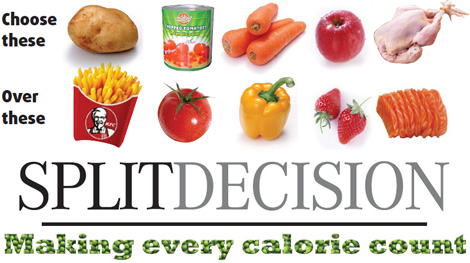
Obesity experts say the lousy economy threatens to worsen people's waistlines because bad-for-you food happens to be the cheapest. But there are healthy cheap eats, and new research aims to show how to eke out the most nutrition out of every buck.
"We wanted to make sure every calorie counted," says Dr Adam Drewnowski, who directs the University of Washington Center for Public Health Nutrition and is pushing for the federal government to put more affordability into the calculation when it issues new dietary guidelines next year.
No, his plan is not a plea to live on salads. After all, salad greens can cost four times as much as green beans and not last nearly as long.
Drewnowski is out to rehabilitate the potato, just not the french-fry version. He says it is time to welcome protein-rich eggs back to the table.
Spinach? Excellent if you can afford it. If not, iceberg lettuce has merit, he insists.
No time to cook from scratch, or live in a low-income neighborhood where good fresh produce is scarce? Frozen veggies can be better buys anyway, he says, and even canned if you watch the sodium.
"The message is now shifting from the most nutrient-rich foods to the most affordable nutrient-rich foods," says Drewnowski.
Two-thirds of US adults are either overweight or obese, and childhood obesity is so widespread that some doctors predict there will soon be a generation with lower life expectancy than their parents. The recession won't help.
"Higher food prices are straining household budgets, especially for low-income families," says Dr James Marks of the Robert Wood Johnson Foundation, who fears rising grocery bills will outstrip what little progress is being made in encouraging better eating and more exercise.
It is a hard fact: Eating healthier can cost more. When you are hungry, you go for what is most filling, meaning calorie-dense foods with lots of added fat and sugar.
"You tend to go for the value meal at a fast-food restaurant," says Jeff Levi of Trust for America's Health, a non-profit health advocacy group.
It is not just the price-tag difference. Drewnowski's research shows education and other demographic factors play a role, too, in whether people have the information to choose more nutritious options - and the extra time it takes to shop and cook for them.
In a recent study of the eating habits of 164 Seattle-area adults, he found women with the highest incomes and most education ate the most nutritious fare, with steadily improving dietary quality for every dollar spent.
Yet when Drewnowski examined what the US Department of Agriculture calls a "thrifty food plan" for healthy eating, he found it takes between nine and 16 hours a week to purchase, prepare and cook while the average US working woman - still the chief family cook - spends about five hours a week doing that.
So Drewnowski started slicing and dicing federal statistics to compare average national prices per portion with the nutritional value of different foods, per 100 calories. Comparing the two rankings let him find best buys, the middle ground between most nutritious yet expensive and the not-so-healthy in each food group.
"Milk is off the charts," Drewnowski says, especially if people choose low-fat versions over sugar-packed, no-nutrient colas. "It won't be spinach and arugula and poached salmon. It'll be potatoes and beans and (lean) ground beef and milk and yogurt."
On his list, carrots trump peppers, and apples trump strawberries, as cheaper and longer-lasting. Canned tomatoes pack even more of the nutrient lycopene than pricier fresh ones. Canned or frozen corn kernels mean no paying for the cob.
Somewhere between expensive salmon and cheap bacon comes lean hamburger - just drain it well - and chicken that can be quick-cooked many ways besides artery-clogging deep-fried.
Then there is the potato, maligned by the anti-carb movement. It actually has more potassium than a banana, fiber and even vitamin C. Just no fatty fries: Boil or mash or bake, and go easy on the butter. "It got nations through famines," Drewnowski notes.
taken from : China Daily



No comments:
Post a Comment